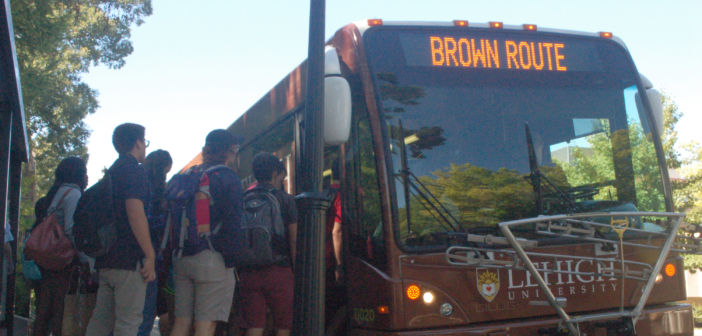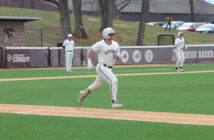Of the students who took the 2017 Student Life Survey, 65.4 percent believe the cost of parking is one of the biggest problems at Lehigh and 24.3 percent believe campus transportation is the biggest issue for the 2017-18 academic year.
The Brown and White interviewed five students about their experiences with on-campus parking and busing. Some were bothered by inconveniences and lack of transparency, while others expressed concern with overall safety.
“My biggest problem with parking is the lack of information that students are given about the appeals process and how that works,” Dixie Miller, ’19, said.
Miller was on the crew team during her first two years at Lehigh and was given a parking ticket during winter training.
“I had gone up to the grocery store to get something, and when I came back, it had started snowing,” Miller said. “They hadn’t plowed anything yet. I couldn’t get my car up the hill to the lot I was assigned to, so I moved my car to a lower lot on campus.”
According to Lehigh’s complete parking regulations, snow emergency regulations are put into effect when the snow accumulation in the Allentown-Bethlehem area officially reaches one inch.
Unless otherwise noted, parking is prohibited on lower campus during a snow emergency between midnight and 7:30 a.m.
Miller said she also received a parking ticket earlier this year when her car wouldn’t start and she was waiting for someone to jump it. Instead of going through the appeals process, Miller said she went directly to Transportation Services and her ticket was waived.
“It was interesting that (Transportation Services) had the power to override that, and they were considerate of my situation,” Miller said. “I think there’s a discrepancy with the reasons that allow tickets to be forgiven. I feel like there are question marks there and no one knows what happens, how the appeals committee is formed or who sits on it.”
Eden Weinflash, ‘17, ‘18G, said parking on campus is restrictive because the only place students can always park their cars is at their own residence halls.
As a Gryphon, Weinflash said she also watched first-year students struggle because they are not allowed to have cars on campus.
“One time my resident was really sick and it was hard for her to get out of bed, let alone go all the way up to the health center, so I obviously drove her there,” Weinflash said. “It’s just things like that where it’s frustrating and you might have to break some rules to get around it.”
Weinflash now lives off campus and finds parking is much less of a hassle.
“If I park where I’m not supposed to in Bethlehem, I get a $10 ticket and I’m OK with that, but if I’m parked where I’m not supposed to on Lehigh’s campus, I get a $50 ticket,” Weinflash said. “It’s more than a slap on the wrist.”
Brett Johnson, an assistant manager of Parking Services, wrote in an email that the current price of parking tickets was decided during the 2008-2009 academic year.
“This decision was made to free up parking spaces from illegally parked vehicles,” Johnson wrote. “The fines were set at rates similar to those found at universities comparable to Lehigh.”
While some students might never have to pay the price of a parking ticket, they do need to pay $414 for a Lehigh parking pass if they want to have their cars on campus.
According to University Business Services’ overview of parking regulations, the revenue brought in from parking passes “goes directly to fund parking lot and garage maintenance and the enhancement of parking services.”
Examples of enhancing parking services include expanded hours in the Parking Office, meters with 10-minutes-free buttons, reloadable SMARTcards and extensive seal coating and repaving on all campuses to improve the safety of parking lots.
Bridget Bell, ’19, said students should be able to expect perfect parking conditions considering the amount they pay to have cars on campus. Despite this expectation, Bell’s car was severely damaged after a storm. She believes it could have been avoided if parking conditions were better.
“There was a storm, and it wasn’t that bad, but a tree branch fell on my car and shattered the back windshield, cracked the front windshield and cracked my driver’s side mirror,” Bell said. “The branch that fell on my car was dead, so I feel like, if anything, (Facilities) should be clearing branches. I don’t think there should be large trees hanging over parking lots.”
Bell said Lehigh is only going to cover the cost of her back windshield because there was not enough evidence that a branch broke the front windshield, too, although she’s sure this was the cause.
Bell said large trees hang over almost half of her assigned parking lot on the Hill, which could prove dangerous in bad weather and during the winter months. Bell said she is frustrated that she still has to pay to park in certain places on or around campus, along with paying for a parking pass and covering the rest of the damages to her car out of pocket.
Diana Nicholas, ’19, said it is frustrating that much of the parking available to students is metered-parking.
“I pay a lot of money to be able to park on campus, and the additional charges that come from driving to class seem unfair,” Nicholas said. “When I’m running late in the morning or on my way to an afternoon class, I’m never sure if I will be able to get parking in close proximity to my class. It’s always a roll of the dice.”
Students who do not have cars on campus still face challenges when using Lehigh’s transportation system.
Charlie Williams, ’20, said he struggles to catch the bus after some of his classes, and when he does, conditions are not ideal.
“I’ve recently taken the bus at (noon) from Packer (Avenue) and it’ll be chock-full of what has to be an unsafe amount of people, packed in there like sardines,” Williams said. “At other points in the day, I’ll literally be the only person on the bus. It feels like this can be managed better.”
Robert Bruneio, the manager of Transportation Services, said the bus routes were configured with student concerns and class schedules in mind. Bruneio said he has visited the Registrar to better understand class times.
In the spring semester, Transportation Services ran two Packer Express buses at once in response to student complains about the overcrowded noon bus.
“We worked with Student Senate to get the word out and get the second bus put on,” Bruneio said. “Everybody jumped on the first bus and on the second bus, we had six people.”
Although the experiment did not go as planned, Bruneio said that does not mean it won’t be revisited.
“We hear your request, we look at it, we have probably tried it or thought about it, and then if it’s really something that’s workable we’ll run an experiment on it,” Bruneio said. “We’ll try it. If it works, we work it into the plan, but if it doesn’t, we go back to the drawing board.”
Miller said convenience is an afterthought when sometimes the bus system does not feel safe.
“The roads are rough, and when you have a lot of people on a bus during a busy time like lunch hour, there’s a lot of people standing and not much room to grab onto things,” Miller said. “You’re going over really rough roads and the drivers are going fast to make their times.”
Miller said this can also be scary for first-year students who are experiencing public transportation for the first time like she was.
Bruneio said Transportation Services only hires drivers with commercial driver’s licenses.
“With the commercial driver’s license comes a lot of responsibility and a lot of regulations,” he said.
On top of road tests and extensive training, Bruneio said every Lehigh bus driver has to go through a peer education course. Every day, drivers are also required to complete pre-trip and post-trip inspections. Inspections include examining and ensuring the quality of the handbrake, steering mechanism, lighting devices and reflectors, tires, emergency equipment, and other parts of the buses.
Bruneio said student safety is a top priority for Transportation Services. Safety has also been on many students’ minds with the changes to TRACS routes.
“The changes are inconvenient and can be unsafe,” Bell said. “Not every student taking TRACS is drunk. You can be on East Fifth (Street), working with someone on homework or a project, and now you don’t even have the option of taking TRACS home from that spot.”
Bruneio said the TRACS service has been running for so long that many components of its original purpose were lost. He said it was never reliable, and students were often waiting 40 minutes to an hour to find a spot on the TRACS bus.
Bruneio said there are ongoing conversations with Student Senate regarding routes. However, for the time being, the East Fifth and Fillmore streets stop has been replaced with a stop at Polk Street in front of the Lehigh University Police Department.
“I hear a lot, ‘Well, we’re not comfortable being there if we’ve had a couple drinks,’ but that’s not the case,” Bruneio said. “The point is we want to make sure the bus comes every 10 minutes, and more importantly, we want to get you to your location safely.”






Comment policy
Comments posted to The Brown and White website are reviewed by a moderator before being approved. Incendiary speech or harassing language, including comments targeted at individuals, may be deemed unacceptable and not published. Spam and other soliciting will also be declined.
The Brown and White also reserves the right to not publish entirely anonymous comments.